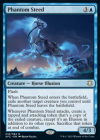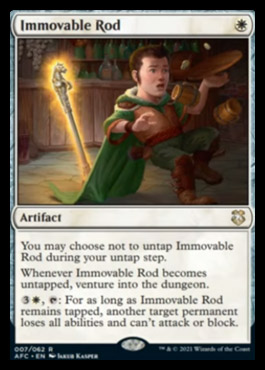Me too. But I also don’t come from D&D. Is the dice rolling worse in Mtg than it is in D&D? If yes, how so?These cards don't get me excited. I still have a strong dislike for all the dice rolling.
You are using an out of date browser. It may not display this or other websites correctly.
You should upgrade or use an alternative browser.
You should upgrade or use an alternative browser.
Sets (AFR) Adventures in the Forgotten Realms Previews- Dripping with Flavor, and Excess Words!
- Thread starter TrainmasterGT
- Start date
dice rolling is the core variance mechanic of d&d.
using a randomized deck of cards is the core variance mechanic of mtg
no need for both
using a randomized deck of cards is the core variance mechanic of mtg
no need for both
Another important difference is, that in Magic you poay against your friends, in D&D you (usually) play with them together. Also, the dungeon master (the person who tells and leads the story) can still be harsh or nice to you.
In my D&D experiences die rolling has never lead to feel bad moments. In magic, a random effect you can't even influence (unlike the top of your library) sounds like a horrible idea.
In my D&D experiences die rolling has never lead to feel bad moments. In magic, a random effect you can't even influence (unlike the top of your library) sounds like a horrible idea.
D&D isn't a competitive game, it's a social experience. In roleplaying games, you use dice to resolve uncertainty because it helps drive the story in unexpected directions and create memorable experiences. The context is different.Me too. But I also don’t come from D&D. Is the dice rolling worse in Mtg than it is in D&D? If yes, how so?
It does the same thing in Magic: the Gathering, but when you're a in competitive game against another player, you're not taking on the role of someone in the finals of a local FNM. You are that person, and a lot of people want their victory to be validated by a feeling that they played well, not that they rolled well. They want to maintain the belief that they are a participant in the game, and not a spectator. Rolling a dice is a very overt way of signaling the introduction of randomness into a game, and critically different from the randomness of the cards you draw. When you are playing a d20 card you are gambling on it doing the thing you want it to. When you are given a bad hand you are basically living the American dream and being asked to be resourceful with the tools you have been given.
Onderzeeboot
Ecstatic Orb
Me too. But I also don’t come from D&D. Is the dice rolling worse in Mtg than it is in D&D? If yes, how so?
Mown sums it up very well. Brad makes a good point as well. I'll add that the weight of a single die roll is way less important in D&D. Everyone rolls d20's to resolve attacks and skill checks, and the party's success (typically) doesn't hinge on a single d20 roll. Because the sheer number of d20 rolls involved, it becomes more a game of averages, where the variance of the d20 roll determines the difference between success and failure for individual rolls, but (again, typically) not the outcome of the entire fight. Compare this to Magic, where in a 1v1 match, there are a lot less decision points anyway, let alone die rolls, since most cards don't use die rolls. This means the impact of a single d20 roll is going to be a lot bigger by comparison, as is the feelbad potential (either for you, because you rolled bad, or for the opponent, because you rolled really good).D&D isn't a competitive game, it's a social experience. In roleplaying games, you use dice to resolve uncertainty because it helps drive the story in unexpected directions and create memorable experiences. The context is different.
It does the same thing in Magic: the Gathering, but when you're a in competitive game against another player, you're not taking on the role of someone in the finals of a local FNM. You are that person, and a lot of people want their victory to be validated by a feeling that they played well, not that they rolled well. They want to maintain the belief that they are a participant in the game, and not a spectator. Rolling a dice is a very overt way of signaling the introduction of randomness into a game, and critically different from the randomness of the cards you draw. When you are playing a d20 card you are gambling on it doing the thing you want it to. When you are given a bad hand you are basically living the American dream and being asked to be resourceful with the tools you have been given.
I was never going to be excited for the D&D set, but my overall feelings are still those of disappointment. The cards don't represent the world of D&D, it represents a game of D&D. Instead of portraying the fiction, the game pieces end up portraying other game pieces; you view Forgotten Realms through the lens of a player instead of an inhabitant. It's really jarring, and I'm not a fan. Not all the cards are like this of course, but a very substantial portion of them are.
I find venture to be an interesting mechanic that ultimately comes short in execution. I am excited about what I can do with it as a cube designer, given the freedom to make my own venture cards and dungeons, but the current reality of dungeons is one of little design space to grow in the future, and a very lacking set of enablers in the present. I'm also concerned about how further iterations of similar mechanics might bloat the game in the future.
The class cards are mechanically excellent, and I hope to see more of them in the future. Hopefully in a context with more organic theming.
I don't hate the die-rolling cards, but I don't much care for them either. My sentiments on the flavor words are much the same, they feel like a design crutch to me more than anything.
I find venture to be an interesting mechanic that ultimately comes short in execution. I am excited about what I can do with it as a cube designer, given the freedom to make my own venture cards and dungeons, but the current reality of dungeons is one of little design space to grow in the future, and a very lacking set of enablers in the present. I'm also concerned about how further iterations of similar mechanics might bloat the game in the future.
The class cards are mechanically excellent, and I hope to see more of them in the future. Hopefully in a context with more organic theming.
I don't hate the die-rolling cards, but I don't much care for them either. My sentiments on the flavor words are much the same, they feel like a design crutch to me more than anything.
This is putting into words pretty much exactly what I've felt about the set, and made me realize that I would've liked the latter much better.you view Forgotten Realms through the lens of a player instead of an inhabitant
This is especially problematic since part of playing an RPG is trying to view the world through the lens of an inhabitant¹. So it ends up feeling really off thematically.you view Forgotten Realms through the lens of a player instead of an inhabitant
¹ Let's not get into different roleplaying stances here.
I feel like you're saying one thing but meaning another.¹ Let's not get into different roleplaying stances here.
You see them rolling and you're hating?It's unfortunate that they went so deep into dice rolling with this set of commander decks. I'm glancing through spoilers and as soon as I come across "roll" or "venture" I'm out. Especially dislike the variety of dice needed to fulfill different roll requirements. What a fucking mess.
I am in LOVE with the commander decks.
Also in love with how they powercrept Search the Premises INSTANTLY. They knew how freaking bad this was and I'm glad to see they know how to do better. This isn't even close in terms of powerlevel, at least outside of
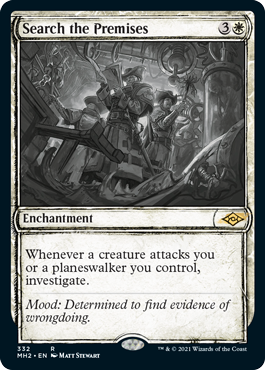
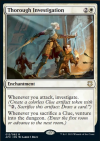
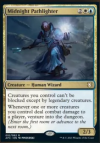
Also, this seems kind of legit? Cubes tend to have a lot of legendary creatures, but this might be too swingy. Either way, I'm starting to consider adding some cards with Venture into my cube--but I will almost certainly not bring any of the payoffs in.
Also in love with how they powercrept Search the Premises INSTANTLY. They knew how freaking bad this was and I'm glad to see they know how to do better. This isn't even close in terms of powerlevel, at least outside of



Also, this seems kind of legit? Cubes tend to have a lot of legendary creatures, but this might be too swingy. Either way, I'm starting to consider adding some cards with Venture into my cube--but I will almost certainly not bring any of the payoffs in.
Onderzeeboot
Ecstatic Orb
Ooo! Thourough Investigation is nice. I don't know if it's worth three mana, but improving clues is nice!
I was never going to be excited for the D&D set, but my overall feelings are still those of disappointment. The cards don't represent the world of D&D, it represents a game of D&D. Instead of portraying the fiction, the game pieces end up portraying other game pieces; you view Forgotten Realms through the lens of a player instead of an inhabitant. It's really jarring, and I'm not a fan. Not all the cards are like this of course, but a very substantial portion of them are.
I find venture to be an interesting mechanic that ultimately comes short in execution. I am excited about what I can do with it as a cube designer, given the freedom to make my own venture cards and dungeons, but the current reality of dungeons is one of little design space to grow in the future, and a very lacking set of enablers in the present. I'm also concerned about how further iterations of similar mechanics might bloat the game in the future.
The class cards are mechanically excellent, and I hope to see more of them in the future. Hopefully in a context with more organic theming.
I don't hate the die-rolling cards, but I don't much care for them either. My sentiments on the flavor words are much the same, they feel like a design crutch to me more than anything.
Please poste all of your custom Dungeon cards in the custom card thread
https://riptidelab.com/forum/threads/custom-cards-the-lab.403/page-126
It's only going to do nothing if you don't have a land in hand.
Making a chump blocker that does a pretty decent Sakura-Tribe Elder impression when it dies seems kinda fun.
Making a chump blocker that does a pretty decent Sakura-Tribe Elder impression when it dies seems kinda fun.
Sakura-Tribe Elder fetches from the library. This is more of a Arboreal Grazer impression.
Onderzeeboot
Ecstatic Orb
This one's fun. I already run Faerie Vandal and Jolrael, Mwonvuli Recluse, so I'm kind of interested in this one.
I'm at least gonna give this one a shot. I like the draw-two theme even if I suspect this is usually "make a 1/1 do nothing when it dies".
Sakura-Tribe Elder fetches from the library. This is more of a Arboreal Grazer impression.
Nah. Grazer drops a land when you play it — these (potentially) drop a(n untapped) land when they die, which is kinda like Steve if you squint. I actually can't think of any creatures that drop a land from your hand when they die, so there really isn't a clean, 121 comparison here.
There's hilarious synergy with Meloku and a sac outlet, though.
Nah. Grazer drops a land when you play it — these (potentially) drop a(n untapped) land when they die, which is kinda like Steve if you squint.
Nah. Sakura nets you an additional ressource from the library and can shuffle it if you need to. These ones can only get your lands from the hand to the battlefield. And only if you have any lands left in the hand which is not super, super likely to happen by turn 5 or later.
Last edited:

